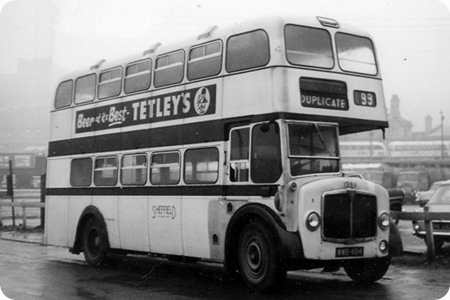
Sheffield Corporation
1956
AEC Regent III
Weymann Orion L27/28R
Now I know what your thinking you think I have got this completely wrong, this is surely a Regent V you say. No it is definitely a Regent III there was a small number of late Regent IIIs that were built with the wide bonnet front more associated with the Regent V and this is one of them.
I also have a shot of another Sheffield Corporation Regent that could be a bit dubious, registration WWB 542 fleet no 742, it is different to above in that it has an odd shaped window on the staircase and no air vent at the front of the roof, I would guess at Roe bodywork myself. I think that it also maybe a Regent III as that registration dates from 1955/6 and I can find no details of it in the Regent V lists on the excellent Bus Lists on the Web website. If you know please leave a comment.
742 was VWJ 542 Regent III 9613S with Roe H33/25R body, new in 1956.
David Harrison
After over 150 exposed radiator Regent IIIs, Sheffield had 41 Roe and 36 Weymann H58R and 9 Weymann L55R Regent IIIs with manual boxes and the new “Regent V” front. This was in 1955/6 and they followed immediately by 40 genuine Regent Vs with Weymann H58R bodies identical to the earlier Weymann/Regent IIIs. The latter arrived in 1957.
David Oldfield
04/05/11 – 07:06
These were the only lowbridge double deckers in the Sheffield fleet post war (and for some considerable time pre war). See Keith Beeden’s comments re Sheffield 1265 for the reason behind this unusual purchase. Four buses (1284-7) survived the rest of the batch by up to four years and made themselves unpopular turning up on a variety of (non lowbridge) services not least being regular performers on the 50 to the posh village of Dore, on the edge of the Peak District.
1284 is pictured in Pond Street Bus Station for a duplicate on the normally single deck service 99 to Chesterfield via the village of Ford which required single deck buses beyond that point.
Ian Wild
05/05/11 – 07:00
It’s amazing how such a fine builder as Weymann could make the Orion look so fine – as it did for almost all Sheffield’s high-bridge variants – but managed to make such a dog’s breakfast of the low-bridges. They had several attempts and failed – the North Western PD2s neither being the same as 1283-91 nor as neighbouring East Midland examples.
It’s also true that high-bridge Leylands were generally not so handsome as those on almost any other chassis because of the narrow front profile.
I read that, when Leyland closed down the body shop in 1954 that there was a tacet agreement that Leyland body customers would be edged in the direction of MCW (ie MCCW AND Weymann) and this obviously manifested itself in the carry-over from Leyland of a standard 7’6″ front, even on 8’0″ wide bodies (but with the tapering effect). Bizarrely, the best looking and most balanced “low” Orions were on East Midland and Yorkshire Woolen’s Albion Lowlanders – where Alexander made a pig’s ear of it!
“First” are still managing to put old rubbish on the (now) 30 to Dore. Is it giving the finger to the unworthy rich – or missing a trick in encouraging onto public transport?
David Oldfield
03/02/12 – 15:27
During the school holidays we use to travel on these buses to the mining area pits (my Mum also worked full time so holidays were spent on whatever route my dad was driving. My Auntie was the conductress).I remember there being 4 bench seats in a row to the nearside & access was lower to the seat height. Cannot remember what happened over the drivers cab, but those front seats must also have been higher than the access route.Downstairs offside was the lowered access route with notices for passengers to “watch your heads” My Dad used to say you can buy the best quality towels from the pit shop at really cheap prices. I think it may have been Orgreave pit. We also used to go on Regents single deckers with the doors & access stairs to the doors & these were the first buses we saw that had a round, chrome heater behind the bulkhead to keep you warm, which we appreciated at 5.30am on cold mornings.
Andy Fisher
28/12/17 – 15:46
Dear David
Following your conversation with the Regent III, I am requiring some advice on the Model of my RLH from the Samuel Buses and I am hoping to try and find out if the Regent III types above was the similar bus and I am hoping to change the lower deck to the Regent V front and I am requesting some tips on how to get the job done and what bus to use either the Corgi or the Orion Regent but I do have a quite a few of the buses in the fleet and then I am hoping to do the low height of the bus.
Christopher Norris
29/12/17 – 10:48
It would be good to have a pic of Doncaster CT’s 122 on this site. It was an AEC Regent 3 with a number of interesting features including a stepped boarding platform, those early 50’s deep Roe windows and cranked seating. It also had a Potts Patent air system and I have no idea what that is? 122 has a political history, sold early on with its CVD6 sister to local operators (of which Doncaster had many) on the pretext of being too wide at 8ft to fit the town’s streets (which?), but actually, it seems, not the streets but the DCT bus washer. It is still around in preservation, having been beautifully restored back to DCT glory by the late Tony Peart.
Joe
Leave a Reply